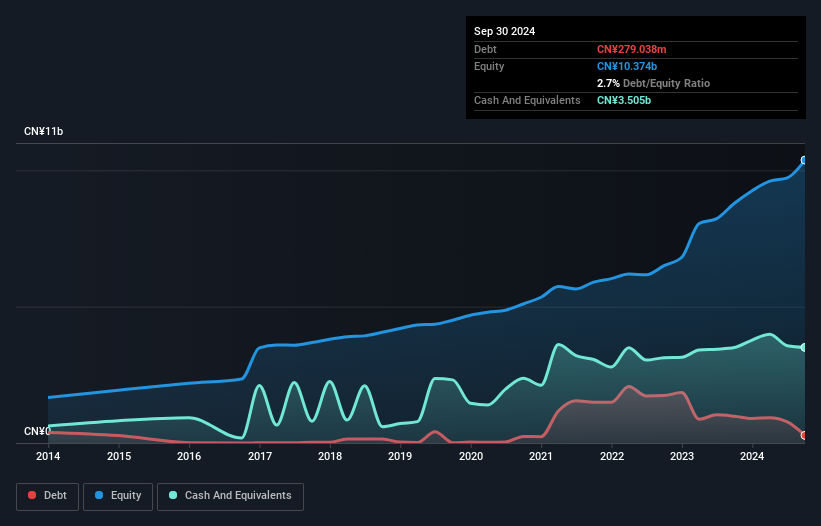We Think Hangcha Group (SHSE:603298) Can Stay On Top Of Its Debt
Some say volatility, rather than debt, is the best way to think about risk as an investor, but Warren Buffett famously said that 'Volatility is far from synonymous with risk.' When we think about how risky a company is, we always like to look at its use of debt, since debt overload can lead to ruin. Importantly, Hangcha Group Co., Ltd (SHSE:603298) does carry debt. But the real question is whether this debt is making the company risky.
Why Does Debt Bring Risk?
Generally speaking, debt only becomes a real problem when a company can't easily pay it off, either by raising capital or with its own cash flow. Ultimately, if the company can't fulfill its legal obligations to repay debt, shareholders could walk away with nothing. However, a more common (but still painful) scenario is that it has to raise new equity capital at a low price, thus permanently diluting shareholders. Of course, debt can be an important tool in businesses, particularly capital heavy businesses. When we think about a company's use of debt, we first look at cash and debt together.
Check out our latest analysis for Hangcha Group
What Is Hangcha Group's Debt?
The image below, which you can click on for greater detail, shows that Hangcha Group had debt of CN¥279.0m at the end of September 2024, a reduction from CN¥981.1m over a year. But it also has CN¥3.51b in cash to offset that, meaning it has CN¥3.23b net cash.

How Strong Is Hangcha Group's Balance Sheet?
We can see from the most recent balance sheet that Hangcha Group had liabilities of CN¥4.71b falling due within a year, and liabilities of CN¥407.6m due beyond that. Offsetting these obligations, it had cash of CN¥3.51b as well as receivables valued at CN¥3.44b due within 12 months. So it actually has CN¥1.82b more liquid assets than total liabilities.
This short term liquidity is a sign that Hangcha Group could probably pay off its debt with ease, as its balance sheet is far from stretched. Simply put, the fact that Hangcha Group has more cash than debt is arguably a good indication that it can manage its debt safely.
Also good is that Hangcha Group grew its EBIT at 16% over the last year, further increasing its ability to manage debt. The balance sheet is clearly the area to focus on when you are analysing debt. But it is future earnings, more than anything, that will determine Hangcha Group's ability to maintain a healthy balance sheet going forward. So if you're focused on the future you can check out this free report showing analyst profit forecasts.
Finally, a company can only pay off debt with cold hard cash, not accounting profits. While Hangcha Group has net cash on its balance sheet, it's still worth taking a look at its ability to convert earnings before interest and tax (EBIT) to free cash flow, to help us understand how quickly it is building (or eroding) that cash balance. In the last three years, Hangcha Group's free cash flow amounted to 37% of its EBIT, less than we'd expect. That weak cash conversion makes it more difficult to handle indebtedness.
Summing Up
While we empathize with investors who find debt concerning, you should keep in mind that Hangcha Group has net cash of CN¥3.23b, as well as more liquid assets than liabilities. And it impressed us with its EBIT growth of 16% over the last year. So we don't think Hangcha Group's use of debt is risky. Over time, share prices tend to follow earnings per share, so if you're interested in Hangcha Group, you may well want to click here to check an interactive graph of its earnings per share history.
When all is said and done, sometimes its easier to focus on companies that don't even need debt. Readers can access a list of growth stocks with zero net debt 100% free, right now.
Valuation is complex, but we're here to simplify it.
Discover if Hangcha Group might be undervalued or overvalued with our detailed analysis, featuring fair value estimates, potential risks, dividends, insider trades, and its financial condition.
Access Free AnalysisHave feedback on this article? Concerned about the content? Get in touch with us directly. Alternatively, email editorial-team (at) simplywallst.com.
This article by Simply Wall St is general in nature. We provide commentary based on historical data and analyst forecasts only using an unbiased methodology and our articles are not intended to be financial advice. It does not constitute a recommendation to buy or sell any stock, and does not take account of your objectives, or your financial situation. We aim to bring you long-term focused analysis driven by fundamental data. Note that our analysis may not factor in the latest price-sensitive company announcements or qualitative material. Simply Wall St has no position in any stocks mentioned.
About SHSE:603298
Hangcha Group
Manufactures and sells forklift products in China and internationally.
Excellent balance sheet with proven track record.
Market Insights
Community Narratives



